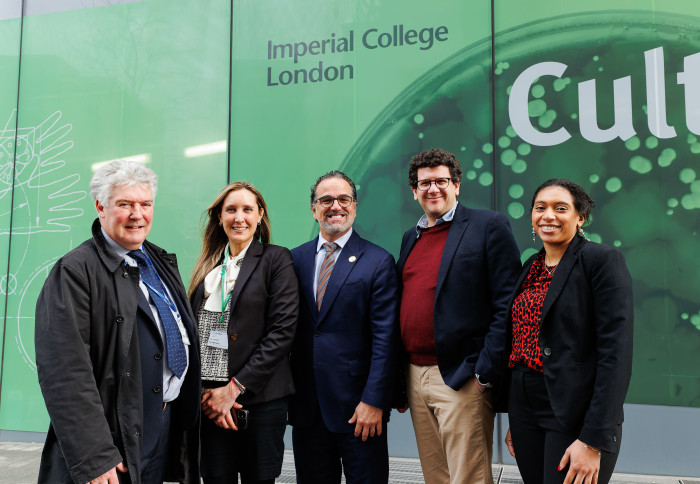Ecuador Environment Minister praises green tech innovation at White City Campus

Ecuador’s Environment Minister Gustavo Manrique Miranda visited Imperial’s White City Campus to see a pioneering plastic alternative.
The Minister met academics and visited the laboratories of biodegradable plastics scaleup Polymateria – based in Imperial’s I-Hub.
Ecuador is making efforts to tackle plastic pollution and has introduced laws to ban single use plastic to focus on biodegradable alternatives and other materials. Polymateria is an example of the biodegradable plastic technology that Ecuador is working to adopt.
Gustavo Manrique Miranda, Minister of the Environment, Water and Ecological Transition of Ecuador, said: "I’m delighted to visit Imperial College London to learn more about this wonderful innovation ecosystem and to see first-hand Polymateria's exciting technology for tackling plastic pollution. As we move ahead with our ambitious plans to achieve sustainability in Ecuador, this is exactly the sort of innovative approach we welcome. I look forward to seeing Polymateria's technology rolled out widely across Ecuador".
Professor Frank Kelly, Director of Imperial’s Environmental Research Group, welcomed the Minister and presented the College’s flagship Transition to Zero Pollution Initiative – which aims to go beyond thinking about zero carbon and consider pollution in all its forms.
Professor Kelly said: "Imperial is a global leader in zero pollution technology and our research and innovations are helping to tackle some of the world's biggest challenges in climate, sustainability and the environment.
"If we are to realise a sustainable zero pollution future we need to create an ecosystem for researchers, entrepreneurs, industry and policymakers to collaborate and translate ideas into solutions.
"This exciting exchange between Polymateria, a pioneering company based at our White City Campus, and a government at the forefront of tackling pollution and protecting biodiversity is a great example of universities working together with industry and policymakers to rapidly translate new technology to benefit society."

Polymateria was the first company to join Imperial’s White City Incubator and is now breaking new ground from Imperial’s I-Hub as the company grows. Polymateria has pioneered innovative ‘biotransformation’ technology that alters the properties of plastic to make it biodegradable in nature, while remaining compatible with recycling systems at scale.
Steven Altmann-Richer, Senior Vice-President for Global Communications & Regulation at Polymateria, said: “Having first met at COP26 in Glasgow, it is now a real privilege to welcome Minister Manrique to our labs at Imperial College London. Through his leadership, Ecuador is playing a leading role to tackle plastic pollution within Latin America. We look forward to our technology playing its part to replace conventional single-use plastics in Ecuador with sustainable alternatives.”
--
Photograph credit: Alistair Veryard/ Polymateria
Article text (excluding photos or graphics) © Imperial College London.
Photos and graphics subject to third party copyright used with permission or © Imperial College London.
Reporter
Stephen Johns
Communications Division